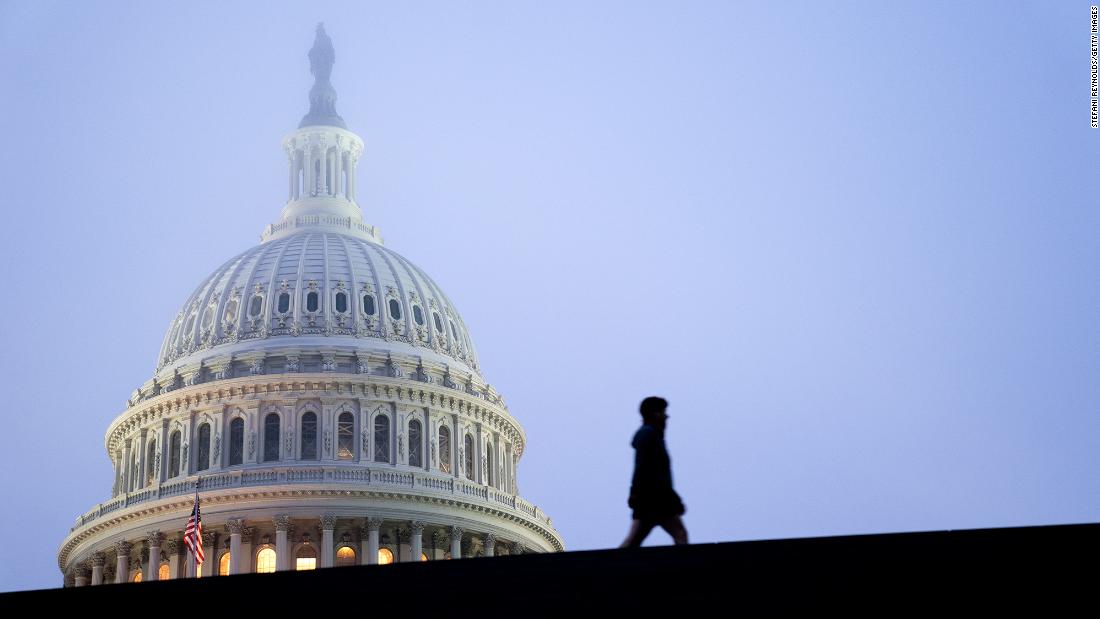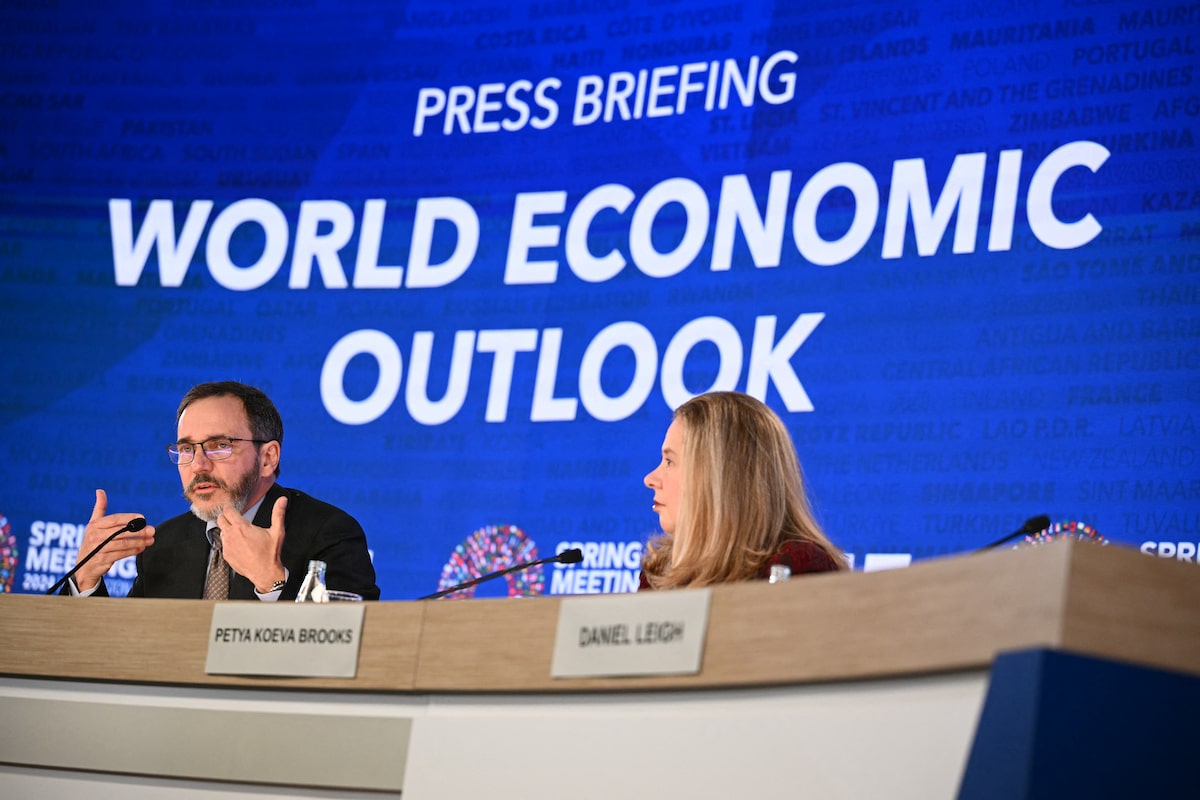Economy
Why the US economy won't gain any traction until 2021 – CNN


Economy
Outlook for global economy is brighter, though still modest by historical standards: IMF – The Globe and Mail


IMF Chief Economist Pierre-Olivier Gourinchas and IMF Research Department Deputy Director Petya Koeva Brooks hold a news briefing at IMF headquarters, in Washington, on April 16.MANDEL NGAN/Getty Images
The International Monetary Fund has upgraded its outlook for the global economy this year, saying the world appears headed for a “soft landing” – reining in inflation without much economic pain and producing steady if modest growth.
The IMF now envisions 3.2 per cent worldwide expansion this year, up a tick from the 3.1 per cent it had predicted in January and matching 2023′s pace. And it foresees a third straight year of 3.2 per cent growth in 2025.
In its latest outlook, the IMF, a 190-country lending organization, notes that the global expansion is being powered by unexpectedly strong growth in the United States, the world’s largest economy. The IMF expects the U.S. economy to grow 2.7 per cent this year, an upgrade from the 2.1 per cent it had predicted in January and faster than a solid 2.5 per cent expansion in 2023.
Though sharp price increases remain an obstacle across the world, the IMF foresees global inflation tumbling from 6.8 per cent last year to 5.9 per cent in 2024 and 4.5 per cent next year. In the world’s advanced economies alone, the organization envisions inflation falling from 4.6 per cent in 2023 to 2.6 per cent this year and 2 per cent in 2025, brought down by the effects of higher interest rates.
The Federal Reserve, the Bank of Japan, the European Central Bank and the Bank of England have all sharply raised rates with the aim of slowing inflation to around 2 per cent. In the United States, year-over-year inflation has plummeted from a peak of 9.1 per cent in the summer of 2022 to 3.5 per cent. Still, U.S. inflation remains persistently above the Fed’s target level, which will likely delay any rate cuts by the U.S. central bank.
Globally, higher borrowing rates had been widely expected to cause severe economic pain – even a recession – including in the United States. But it hasn’t happened. Growth and hiring have endured even as inflation has decelerated.
“Despite many gloomy predictions, the global economy has held steady, and inflation has been returning to target,” Pierre-Olivier Gourinchas, the IMF’s chief economist, told reporters ahead the release of the fund’s latest World Economic Outlook.
Though the world economy is showing unexpected resilience, it isn’t exactly strong. From 2000 through 2019, global economic growth had averaged 3.8 per cent – much higher than the 3.2 per cent IMF forecasts for this year and next. Keeping a lid on the world’s growth prospects are the continued high interest rates, along with sluggish gains in productivity in much of the world and the withdrawal of government economic aid that was rolled out during the pandemic.
The IMF warns that the economic expansion could be thrown off by the continuing adverse effects of higher rates and by geopolitical tensions, including the war in Gaza, that risk disrupting trade and raising energy and other prices.
China, the world’s No. 2 economy, has been struggling with the collapse of its real estate market, depressed consumer and business confidence and rising trade tensions with other major nations. The IMF expects the Chinese economy, which once regularly generated double-digit annual growth, to slow from 5.2 per cent in 2023 to 4.6 per cent in 2024 to 4.1 per cent next year.
But on Tuesday, Beijing reported that China’s economy expanded at a faster-than-expected pace in the first three months of the year, fueled by policies that are intended to stimulate growth and stronger demand. The Chinese economy expanded at a 5.3 per cent annual pace in January-March, surpassing analysts’ forecasts of about 4.8 per cent, official data show. Compared with the previous quarter, the economy grew 1.6 per cent.
Japan’s economy, the world’s fourth-largest, having lost the No. 3 spot to Germany last year, is expected to slow from 1.9 per cent last year to 0.9 per cent in 2024.
Among the 20 countries that use the euro currency, the IMF expects growth of just 0.8 per cent this year – weak but double the eurozone’s 2023 expansion. The United Kingdom is expected to make slow economic progress, with growth rising from 0.1 per cent last year to 0.5 per cent in 2024 and 1.5 per cent next year.
In the developing world, India is expected to continue outgrowing China, though the expansion in the world’s fifth-largest economy will slow, from 7.8 per cent last year to 6.8 per cent this year and 6.5 per cent in 2025.
The IMF foresees a steady but slow acceleration of growth in sub-Saharan Africa – from 3.4 per cent last year to 3.8 per cent in 2024 to 4.1 per cent next year.
In Latin America, the economies of Brazil and Mexico are expected to decelerate through 2025. Brazil is likely to be hobbled by interest high rates and Mexico by government budget cuts.
Economy
China economy grows faster than expected in first quarter – BBC.com


China’s economy made a stronger-than-expected start to the year, even as the crisis in its property sector deepened.
According to official data, gross domestic product (GDP) expanded by 5.3% in the first three months of 2024, compared to a year earlier.
That beat expectations the world’s second largest economy could see growth slow to 4.6% in the first quarter.
Last month, Beijing set an ambitious annual growth target for world’s second largest economy of “around 5%”.
Data from the National Bureau of Statistics (NBS) also showed first quarter retail sales growth, a key gauge of China’s consumer confidence, fell to 3.1%.
“You cannot manufacture growth forever so we really need to see households come to the party if China wants to hit that around 5% growth target,” Harry Murphy Cruise from Moody’s Analytics told the BBC.
In the same period property investment fell 9.5%, highlighting the challenges faced by China’s real estate firms.
The figures came as China continues to struggle with an ongoing property market crisis. According to the International Monetary Fund (IMF), the sector accounts for around 20% of the economy.
The latest data also showed new home prices fell at the fastest pace for more than eight years in March.
The real estate industry crisis has been highlighted in January when property giant Evergrande was ordered to liquidate by a court in Hong Kong.
Rival developers Country Garden and Shimao have also been hit with a winding-up petitions in the city.
Last week, credit ratings agency Fitch cut its outlook for China, citing increasing risks to the country’s finances as it faces economic challenges.
At the annual gathering of China’s leaders in March officials said the economy grew by 5.2% in 2023.
For decades the Chinese economy expanded at a stellar rate, with official figures putting its GDP growing at an average of close to 10% a year.
Economy
Stumbling Toward a Deal — as the Economy Surges – AGF Perspectives


Insights and Market Perspectives
CONGRESS IS STUMBLING TOWARD PASSAGE of legislation late this week that would provide enormous aid to Ukraine, Israel and Taiwan. It’s a VERY messy process — typically — that has obscured the major development for financial markets: red hot economic growth, far exceeding expectations.
WE’LL GET TO THE CONGRESSIONAL BRAWL in a second, but first — dramatic economic growth is having a major impact on interest rates, with the Atlanta Fed GDP Now predicting economic growth at 2.8%, after yesterday’s blowout retail sales report.
EVEN CHINA, considered a basket case a few months ago, is blasting off — with Beijing reporting 5.3% first quarter economic growth.
WITH THE U.S. TEN YEAR BOND YIELD now above 4.5%, this has to be a shock for the Federal Reserve, which may be frozen for months to come — unable to cut rates as long as the economy is growing above trend with inflation not falling to the Fed’s 2% goal.
THERE SURELY WON’T BE ANY FISCAL RESTRAINT, as Congress moves awkwardly toward passage of a nearly $100 billion spending package for allies.
THIS IS A VERY FLUID fluid environment — even a Tik-Tok ban is included — with House Speaker Mike Johnson preparing four separate bills in a dizzying process that may require support from Democrats — which could cost Johnson his job.
BOTTOM LINE: This is sausage-making at its ultimate, as Democrats prepare to bail out Johnson, as angry right wingers demand provisions to protect the border, and as aid seems increasingly likely — surely for Israel, probably for Ukraine. It’s only Tuesday, there’s a long way to go; details won’t come into focus for a few more days.
IN THE MEANTIME, THE ECONOMY CONTINUES TO ROAR — it’s too strong, in our opinion, to be sustainable.
THESE DRAMATIC STORIES MAY HAVE TO TAKE A BACK SEAT as the gleeful media is obsessed with the Donald Trump trial. The buzz after the first day was whether Trump dozed off yesterday during the jury selection process, Our advice to Trump — get some espresso, the last thing you want is opponents calling you “sleepy Don.”
The views expressed in this blog are those of the author and do not necessarily represent the opinions of AGF, its subsidiaries or any of its affiliated companies, funds or investment strategies.
The views expressed in this blog are provided as a general source of information based on information available as of the date of publication and should not be considered as personal investment advice or an offer or solicitation to buy and/or sell securities. Speculation or stated believes about future events, such as market or economic conditions, company or security performance, or other projections represent the beliefs of the author and do not necessarily represent the view of AGF, its subsidiaries or any of its affiliated companies, funds or investment strategies. Every effort has been made to ensure accuracy in these commentaries at the time of publication; however, accuracy cannot be guaranteed. Market conditions may change and AGF accepts no responsibility for individual investment decisions arising from the use of or reliance on the information contained herein. Any financial projections are based on the opinions of the author and should not be considered as a forecast. The forward looking statements and opinions may be affected by changing economic circumstances and are subject to a number of uncertainties that may cause actual results to differ materially from those contemplated in the forward looking statements. The information contained in this commentary is designed to provide you with general information related to the political and economic environment in the United States. It is not intended to be comprehensive investment advice applicable to the circumstances of the individual.
AGF Investments is a group of wholly owned subsidiaries of AGF Management Limited, a Canadian reporting issuer. The subsidiaries included in AGF Investments are AGF Investments Inc. (AGFI), AGF Investments America Inc. (AGFA), AGF Investments LLC (AGFUS) and AGF International Advisors Company Limited (AGFIA). AGFA and AGFUS are registered advisors in the U.S. AGFI is a registered as a portfolio manager across Canadian securities commissions. AGFIA is regulated by the Central Bank of Ireland and registered with the Australian Securities & Investments Commission. The subsidiaries that form AGF Investments manage a variety of mandates comprised of equity, fixed income and balanced assets.
About AGF Management Limited
Founded in 1957, AGF Management Limited (AGF) is an independent and globally diverse asset management firm. AGF brings a disciplined approach to delivering excellence in investment management through its fundamental, quantitative, alternative and high-net-worth businesses focused on providing an exceptional client experience. AGF’s suite of investment solutions extends globally to a wide range of clients, from financial advisors and individual investors to institutional investors including pension plans, corporate plans, sovereign wealth funds and endowments and foundations.
For further information, please visit AGF.com.
©2024 AGF Management Limited. All rights reserved.
-
Business23 hours ago
FFAW, ASP Pleased With Resumption of Crab Fishery – VOCM
-
Media24 hours ago
Marjorie Taylor Greene won’t say what happened to her Trump Media stock
-
Media14 hours ago
Trump Media plunges amid plan to issue more shares. It's lost $7 billion in value since its peak. – CBS News
-
Business22 hours ago
Tesla May Be Headed For Massive Layoffs As Woes Mount: Reports – InsideEVs
-
Media23 hours ago
Trump Media stock slides again to bring it nearly 60% below its peak as euphoria fades – National Post
-



 Tech19 hours ago
Tech19 hours agoJava News Roundup: JobRunr 7.0, Introducing the Commonhaus Foundation, Payara Platform, Devnexus – InfoQ.com
-
Real eState18 hours ago
Real estate mogul concerned how Americans will deal with squatters: ‘Something really bad is going to happen’ – Fox Business
-



 Sports18 hours ago
Sports18 hours agoRafael Nadal confirms he’s ready for Barcelona: ‘I’m going to give my all’ – ATP Tour





